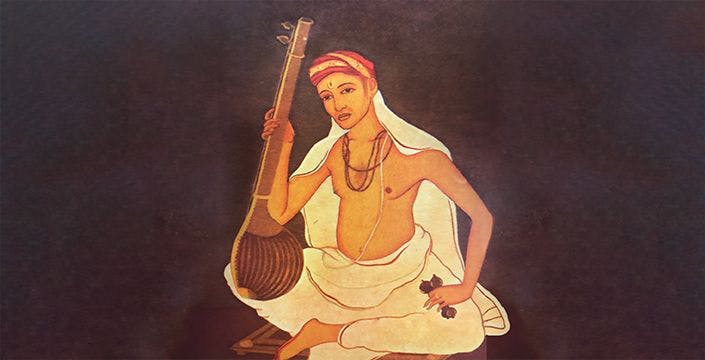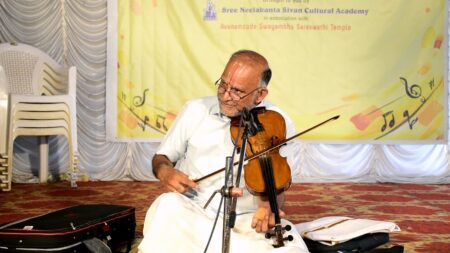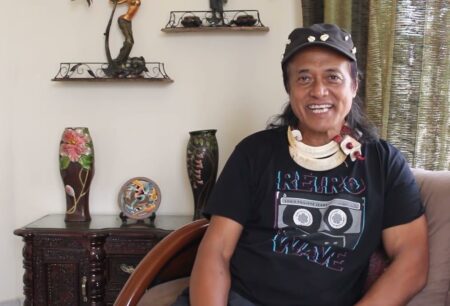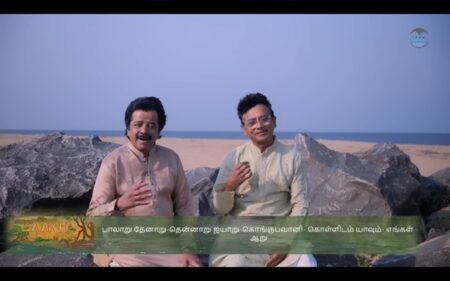A beautiful blend of devotion, music and art encompassed the compositions of Thyagaraja. Today is the 175th Aaradhana of the Saint composer.
Sangeeta gnanamu bhakti vina sanmargamu galade… Without devotion in music can one find the right path?Propitiation of God assumes many forms. From a simple flower to elaborately decorated garlands, from a humble vermillion to a veritable feast, expressions of devotion assume many forms. The Bhakti Movement that began in 7th century in India brought on an aspect of total surrender to God and was expressed through esoteric offerings in poetic form. This was the commonly understood path of spirituality and means to salvation.
From the 8th century, the movement swept through South India, slowly spreading up north. Alwars and Nayanmars, devotees of Vishnu and Shiva, respectively, spread the movement through their verses. These poet-saints became popular and the devotional poems they composed brought about a sort of social equality, which enabled common people to ‘access’ their gods without worrying about caste or creed.
Music and the movement
The development of Carnatic music aided in the spread of the Bhakti Movement. Considered by many as a divine form, Carnatic music is revered as nada brahmam, meaning the ultimate God. Verses on gods and goddesses in due course became compositions to be sung, expressing all forms of adulation of God. Save for an odd composition or two, all the songs in Carnatic music are in praise of or describing the qualities or features of Gods or beseeching them.
Composers in Carnatic music touched upon the idea that Gods favour music. Many passing references have been made indicating that music is divine and that it is a mandatory vehicle to pray to God. The 19th century poet Cheyyur Chengalvaraya Sastri, in one of his compositions writes, “…you should reside on my tongue in the form of music”. Thyagaraja, the 18th century composer and vocalist, known as the foremost of the musical trinity (Thyagaraja, Muthuswami Dikshitar and Shyama Sastri), chronologically speaking, strongly believed that the trinity of Gods, Shiva, Vishnu and Brahma were worshippers of music.
Divine compositions
Thyagaraja composed many songs based entirely on music, exemplifying the qualities and the finer nuances of this fine art. It would not be an exaggeration to say that he is the only composer to do so. Thyagaraja based many of his songs on the slokas of the 13th century composer Sarangadeva’s Sangeeta Ratnakara and on Swararnava, a treatise on music he is believed to have received directly from Sage Narada.
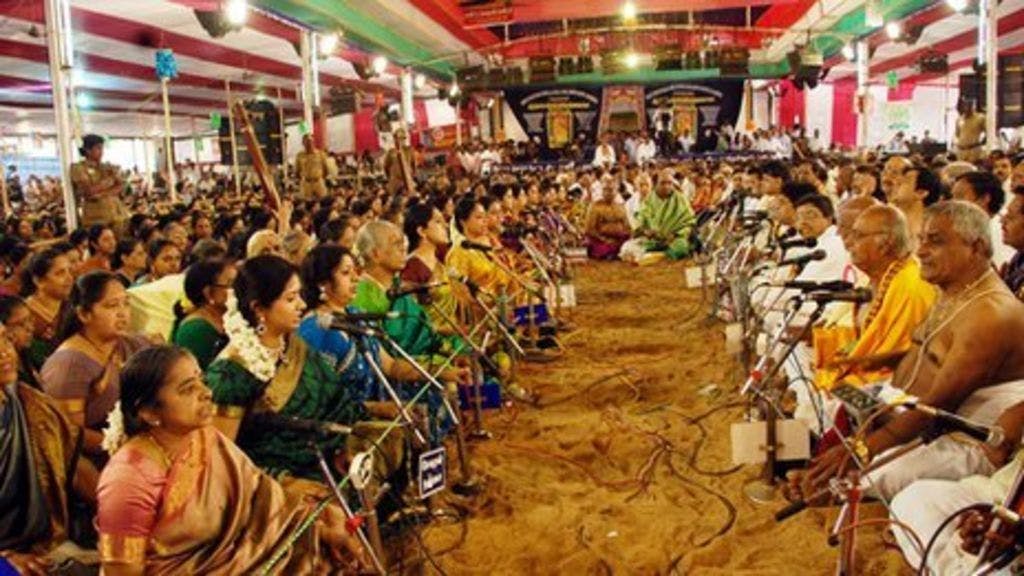
Annual Thyagaraja Aaradhana festival at Thiruvayyaru, the samadhi place of the Saint composer.. (File Image)
The 20-odd kritis Thyagaraja composed talk about the birth of music, its nature, the devas and other personages who worshipped music, the seven swaras, which constituted music, the ragas, which emanated from the swaras, the beauty of the kritis that were formed using the ragas and last but not the least, the indelible link between bhakti and music.
Based on the first sloka of Swararnava, he composed a song ‘Shripapriya Sangeethopasana Cheyave O Manasa’, in which he beseeches his mind to pray to music, which is a great wealth, which dwells in the seven swaras and which is dear to Vishnu, the consort of Lakshmi. In the song “Nada thanumanisam”, Thyagaraja avers that Shiva is the embodiment of music and goes on to say that the seven swaras emanated from the five faces of Shiva. He says “sathyojathathi panchavakthraja sarigamapathani varasapthasvara,” referring to Shiva’s five faces. By linking the five faces of Shiva which represent fire, water, earth, ether and air, Thyagaraja unequivocally stresses that music is made up of the basic elements.
According to the composer, it is not just Shiva, but the Trinity of Gods shone by worshipping music. In the composition ‘Nadopsanache’ he says “Nadopasanachee sankara narayana vidulu velasiri yonamasa.” The Gods don’t just worship, he says, they rejoice in beat, swara and lyrics – “…laya swara ganavinoluru….”
Time and again he stresses his belief that music brings so much joy. In the song ‘Nadadoludai namami’, Thyagaraja extends the concept and says that not just the Trinity of Gods but even Ganesha, Subramanya and Indra are worshippers of music. He orders his heart to immerse itself and greatly rejoice in music – “…brahmananda manthave manasa”.
In one of the most beautiful compositions, excelling in both imagination and similes, ‘Nadasudha rasam pilanu’, he compares Rama’s bow kothandam to a raga, the little bells tied to the bow as the swaras, the three groups of music – ghana, naya, desiyam as the bow string and talas as the arrows. This description is rather unique and is an open declaration of the two things he loves most – Lord Rama and music. At once, it makes a statement that God and music are inexorably intertwined.
Bhakti and moksha
The concept of moksha (the closest English equivalent could be liberation or salvation) is unique to Indian philosophy. In the song ‘Mokshamu Galada’, Thyagaraja questions whether it is possible for anyone to attain moksha if one doesn’t seek God with bhakti and music – “…sangeeta gnanamu viheenulaku… mokshamu galada?”
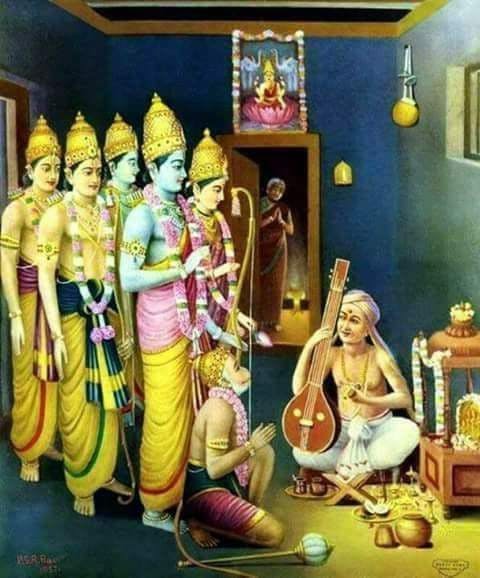
It is also expressed in Sanskrit text based on Dharmashastra tradition titled Yajnavalkya Smriti in a positive way. “The one who is well versed in veena, one who has the knowledge of srutis and one who is adept in tala, attains liberation, without doubt.” The 18th century Carnatic classical music composer Oothukadu Venkata Kavi (Subbaiar) had declared “…bhakti yoga sangeeta margame parama pavanamagume.” He believed that that only music combined with bhakti can lead to salvation. Thyagaraja, too, was convinced of this principle. He declared that bhakti and music were inseparable and that combination was the only path of righteousness – “sangeeta gnanamu bhaktivina sanmargamu galade manasa”. A soul that doesn’t swim in the ocean called music is a burden to this universe which he illustrates thus in his song ‘Ananda Sagara Midani’: “Ananda sagara meedani dhehamu bhumi baramu….”
More than a century later Friedrich Nietzsche echoed similar thoughts: “Without music, life would be a mistake.” Thyagaraja’s contribution to music can never be over-stated. He lived and breathed music. His compositions amplified his thoughts on music and how he revered it. He did so without the slightest deviation from his devotion to God and beautifully combined one with the other. He convincingly portrayed that music is the ultimate God and the path to salvation is through bhakti. “When words fail, music speaks.” But for Thyagaraja, both worked, to bring him on the path to moksha.

